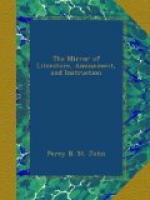At a banquet, which it was customary for the doge to celebrate in his palace, after the bull-hunt, on the Carnival Thursday, a squabble had arisen from some too pressing familiarity offered by one of the young gallants of the court to his mistress. Michele Steno, a gentleman of poor estate, was enamoured of a lady in attendance upon the dogaressa; and, presuming upon her favour, he was guilty of some freedom which led the doge to order his exclusion.—This command appears to have been executed with more than necessary violence; and the youth, fired by the indignity which disgraced him in the eyes of his mistress, sought revenge by assailing Faliero in that point in which he conceived him to be most vulnerable. He wrote on the doge’s chair, in the council chamber, a few words reflecting upon the dogaressa: “Marino Faliero, husband of the lovely wife; he keeps, but others kiss her."[7] The offence was traced to its author; it was pitiful and unmanly; yet it scarcely deserved heavier punishment than that which the XL adjudged to it—namely, that Steno should be imprisoned for two months, and afterwards banished from the state for a year. But, to the morbid and excited spirit of Faliero, the petty affront of this rash youth appeared heightened to a state crime; and the lenient sentence with which his treason (for so he considered it) had been visited, was an aggravation of every former indignity offered to the chief magistrate by the oligarchy which affected to control him. Steno, he said, should have been ignominiously hanged, or at least condemned to perpetual exile.
On the day after the sentence, while the doge was yet hot in indignation, an event occurred which seems to have confirmed the chronicler whose steps we are following, in his belief in the doctrine of necessity. “Now it was fated,” he tells us, “that my Lord Duke Marino was to have his head cut off. And as it is necessary, when any effect is to be brought about, that the cause of that effect must happen, it therefore came to pass”—that Bertuccio Israello, Admiral of the Arsenal,[8] a person apparently of no less impetuous passions than the doge himself, and who is described as possessed also of egregious cunning, approached him to seek reparation for an outrage. A noble had dishonoured him by a blow; and it was vain to ask redress for this affront from any but the highest personage in the state. Faliero, brooding over his own imagined wrongs, disclaimed that title, and gladly seized occasion to descant on his personal insignificance. “What wouldst thou have me do for thee?” was his answer: “Think upon the shameful gibe which hath been written concerning me, and think on the manner in which they have punished that ribald Michele Steno, who wrote it; and see how the Council of XL respect our person!” Upon this, the admiral returned—“My Lord Duke, if you would wish to make yourself a prince, and cut all those cuckoldy gentlemen to pieces, I have the heart, if you do but help me, to make you prince of all the state, and then you may punish them all.” Hearing this, the duke said—“How can such a matter be brought about?” and so they discoursed thereon.




